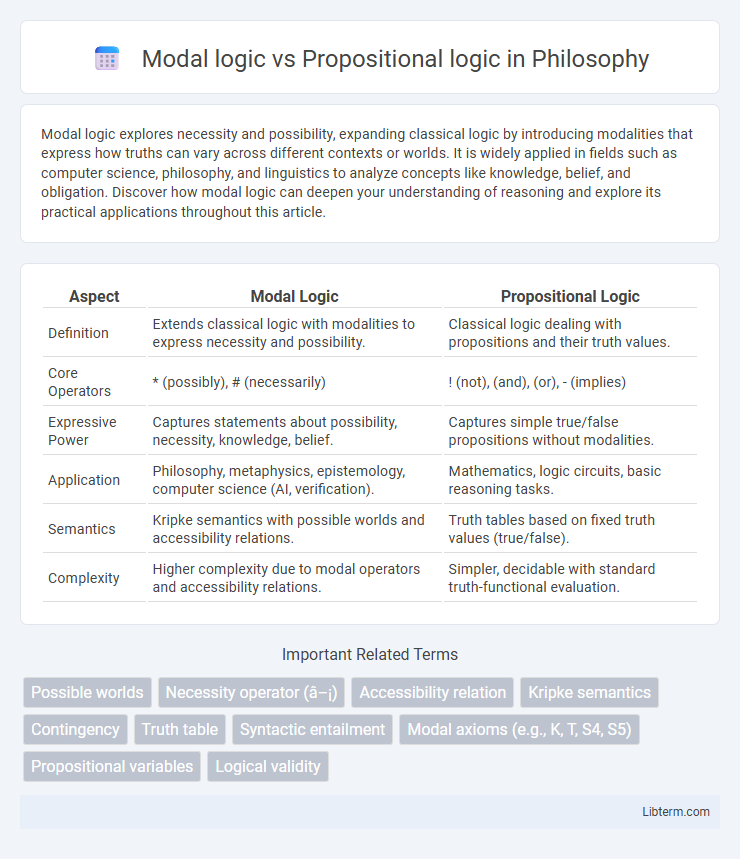Modal logic explores necessity and possibility, expanding classical logic by introducing modalities that express how truths can vary across different contexts or worlds. It is widely applied in fields such as computer science, philosophy, and linguistics to analyze concepts like knowledge, belief, and obligation. Discover how modal logic can deepen your understanding of reasoning and explore its practical applications throughout this article.
Table of Comparison
| Aspect | Modal Logic | Propositional Logic |
|---|---|---|
| Definition | Extends classical logic with modalities to express necessity and possibility. | Classical logic dealing with propositions and their truth values. |
| Core Operators | * (possibly), # (necessarily) | ! (not), (and), (or), - (implies) |
| Expressive Power | Captures statements about possibility, necessity, knowledge, belief. | Captures simple true/false propositions without modalities. |
| Application | Philosophy, metaphysics, epistemology, computer science (AI, verification). | Mathematics, logic circuits, basic reasoning tasks. |
| Semantics | Kripke semantics with possible worlds and accessibility relations. | Truth tables based on fixed truth values (true/false). |
| Complexity | Higher complexity due to modal operators and accessibility relations. | Simpler, decidable with standard truth-functional evaluation. |
Introduction to Modal Logic and Propositional Logic
Modal logic extends propositional logic by introducing modalities such as necessity and possibility, represented by operators like # (necessarily) and * (possibly). Propositional logic deals with simple declarative statements connected by logical connectives (AND, OR, NOT) without addressing concepts of necessity or possibility. Modal logic enables reasoning about statements within different possible worlds or contexts, enhancing expressiveness beyond that of propositional logic.
Core Differences Between Modal and Propositional Logic
Modal logic extends propositional logic by incorporating modalities such as necessity and possibility, represented by operators like (necessarily) and * (possibly), which allow reasoning about statements beyond mere truth values. Unlike propositional logic that deals solely with true or false values of propositions, modal logic evaluates propositions within possible worlds or contexts, enabling expressions about what could be or must be true. The core difference lies in modal logic's capacity to handle notions of necessity, possibility, and contingency, enabling more expressive frameworks for reasoning in philosophy, computer science, and linguistics.
Syntax Comparison: Modal vs Propositional Logic
Modal logic extends propositional logic by incorporating modal operators such as # (necessity) and * (possibility), which express modality beyond true or false values. Propositional logic syntax consists solely of propositional variables combined with logical connectives like , , !, and -, whereas modal logic syntax augments this framework with unary modal operators applied to formulae. The introduction of modal operators in modal logic results in richer formula structures that capture concepts like necessity and possibility, absent in purely propositional syntax.
Semantics of Modal and Propositional Logics
Modal logic extends propositional logic by introducing modal operators such as * (possibility) and # (necessity), enriching the semantics with possible world models that evaluate truth across multiple worlds rather than a single static assignment. Propositional logic semantics relies on truth assignments to propositions, determining formula truth values in a fixed interpretation, whereas modal logic employs Kripke semantics, which uses accessibility relations between possible worlds to evaluate modal statements. The semantic difference enhances modal logic's expressiveness to reason about knowledge, belief, time, and obligation beyond classical propositional truth-functional frameworks.
Expressiveness: What Can Each Logic Represent?
Modal logic extends propositional logic by incorporating modalities such as necessity and possibility, enabling representation of concepts like knowledge, belief, time, and obligation that propositional logic cannot capture. While propositional logic deals with true or false values of basic statements, modal logic can express statements about these statements, such as "It is necessarily true" or "It is possibly true." This increased expressiveness allows modal logic to model dynamic and nuanced scenarios in philosophy, computer science, and linguistics beyond the reach of propositional logic.
Applications of Modal Logic
Modal logic extends propositional logic by incorporating modalities such as necessity and possibility, enabling nuanced reasoning about knowledge, belief, time, and obligation. Its applications span computer science for program verification, artificial intelligence in knowledge representation and reasoning, and philosophy for analyzing epistemic and deontic concepts. Modal logic's ability to model dynamic and uncertain information makes it essential for designing multi-agent systems and temporal reasoning frameworks.
Applications of Propositional Logic
Propositional logic is widely applied in computer science for designing digital circuits, enabling precise circuit verification and optimization. It plays a fundamental role in automated theorem proving, supporting software verification to ensure program correctness. These applications leverage propositional logic's simplicity and efficiency for tasks requiring true/false evaluations without modal notions like necessity or possibility.
Strengths and Limitations of Modal Logic
Modal logic extends propositional logic by incorporating modalities such as necessity and possibility, enabling reasoning about statements beyond mere truth values. Its strength lies in modeling concepts like knowledge, belief, obligation, and time, which propositional logic cannot express. However, modal logic's increased expressiveness often results in higher computational complexity and challenges in decidability compared to classical propositional logic.
Strengths and Limitations of Propositional Logic
Propositional logic excels in simplicity and clear structure, efficiently handling truth-functional operators with finite well-defined propositions. Its main limitation lies in expressing modalities such as necessity, possibility, or beliefs, which require richer frameworks like modal logic. While propositional logic provides a solid foundation for basic logical inference, it lacks the expressive power to represent and reason about modal concepts crucial in knowledge representation and computer science.
Choosing the Right Logic: Use Cases and Considerations
Modal logic extends propositional logic by incorporating modalities such as necessity and possibility, making it essential for reasoning about knowledge, belief, and temporal concepts. Propositional logic suffices for straightforward true/false evaluations without contextual nuances, making it effective in digital circuit design and basic algorithm verification. Selecting the right logic depends on the complexity of the scenario: use propositional logic for deterministic statements and modal logic when addressing uncertainty, obligations, or varying truth across possible worlds.
Modal logic Infographic

 libterm.com
libterm.com